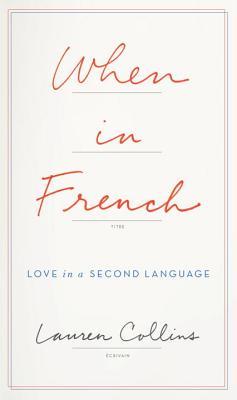What do you think?
Rate this book


256 pages, Hardcover
First published September 13, 2016
Before I met Olivier, my most intensive exposure to the language had occurred during ten days I'd spent camping in the Sahara, on assignment with an American photographer and his crew. The Algerians -- half a dozen young men -- had been superb company, despite the language barrier. But they simply had not been able to figure out what I, an unaccompanied woman, was doing there in the middle of the desert. Neither of the two words I knew in French, oui and non, seemed exactly the right answer to their repeated enquiries as to whether I was virgin.For those of you keeping score, then, the memoir part, the learning-a-new-language-and-culture part were solid wins, the theorizing-about-language less so.
-----
After a month or so of heavy use of public transit, we decided to buy a car. We purchased insurance, which included coverage for theft, fire, natural disasters and dommage causes par les fouines -- damages caused by a type of local weasel...(later, at the dealership) It was pouring, each drop of rain a suicide jumper, hurling itself onto the ramp's tin roof. We circled the car, hoping to project a discerning vibe, as though any painted-over weasel damage would never get by us.
French is said to be the language of love, meaning seduction. I was finding in it an etiquette for loving, what happens next. I had once interpreted Olivier's reticence as pessimism, but I now saw the deep romanticism, the hopefulness, of not wanting to overstate or overpromise. Vous and tu concentrated intimacy by dividing it into distinct shades. I understood, finally, why it made Olivier happy when I wore makeup; why he didn't call me his best friend; why I had never heard him burp. Love was not fusion. Je t'aime was enough.

It is often assumed that the mother tongue is the language of the true self. And in many ways it remains the primal vehicle, the first and most effective responder in moments of celebration or crisis. [...] But if first languages are reservoirs of emotion, second languages can be rivers undammed. A Swiss friend who speaks Spanish with her parents and siblings and French with her husband and children told me that she feels a certain freedom in English, where she occupies the role of neither sister nor mother. People are more likely to say they'd push a man off a bridge - in order to save five other people, about to be hit be a train - when the dilemma is presented in their second language. Scientists call this the emancipatory detachment effect.On the double standard of multilingualiusm:
while learning a foreign language is considered prestigious, acquiring one naturally is stigmatized. We think of foreign languages as extremely hard to learn, but we're incensed when immigrants don't speak English perfectly.I wouldn't go so far to say that it's stigmatized, but agree that we need to reconsider why we're seemingly more impressed by someone who learns a language as an adult than someone who "picked it up" as a child. And while the word "incensed" in the second sentence is too strong, she has a point about the double standard applied to what we expect of speakers.
as soon as we sat down for dinner, the table exploded into chatter, followed by rebuttal, counterargument, rejoinder. That was my impression, at least, judging from the unsmiling looks, the disputatious mais nons, the blowing of air out of cheeks. [...] I felt like an explorer picking her way through a jungle, turning toward stimuli as they chirped and hooted. The language came in an oxytonic rush. It sounded like heavy rain, sluicing down a roof.